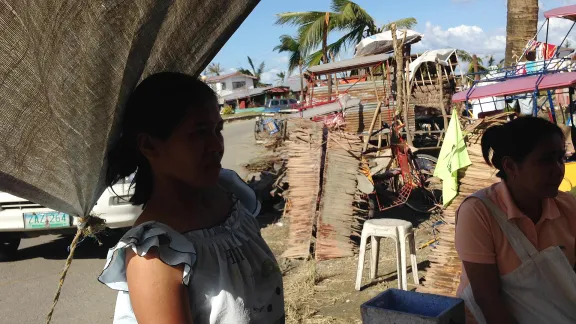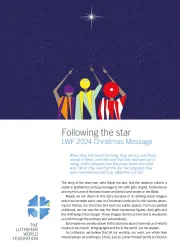
Maria Sol and her family narrowly survived Typhoon Haiyan. Photo: NCCP/ACT
Typhoon Haiyan - A Survivor’s Account
(LWI) - Maria Sol thought her family was prepared for the super typhoon headed towards her home in the community of Basey in Samar Province in the Philippines on 8 November.
They had survived many typhoons before but they were not prepared for the unprecedented fierce onslaught of Typhoon Haiyan or Yolanda, which killed thousands of people and disrupted the lives of millions more, who are now desperately in need of food, water and shelter.
In the midst of so much death and destruction, Sol and her family escaped almost certain death by clinging desperately to the coconut tree near their house— the “tree of life”— she told a volunteer team of the National Council of Churches in the Philippines (NCCP), which is providing relief assistance to thousands of families affected by the extensive devastation from the typhoon. The islands of Leyte and Samar were the most devastated by the “super” typhoon, which has affected around 12 million people in the Philippines’ central region, and displaced more than 674,000.
The Lutheran World Federation (LWF) is supporting NCCP’s response through ACT Alliance, which coordinates emergency relief for churches and their related organizations globally. An ACT preliminary appeal for typhoon Haiyan seeks to raise USD 14 million to provide families like Sol’s with food, clean water, sanitation and hygiene services, and non-food assistance such as plastic sheeting, blankets and tents. Psychosocial assistance will help families to deal with the trauma caused by the disaster.
When the storm hit Basey town, Sol said, “It was strange because the typhoon was not just bringing winds, but also a huge swell in the sea.” She and her husband were dumbfounded as they witnessed the water rising rapidly, flooding the area with a very strong current.
Although they were expecting a large amount of rain and strong winds, they never thought that the water from the sea, which is some distance from their home, would ever reach their neighborhood. Soon they realized their lives were in grave danger as huge tsunami-like waves rose rapidly, and they panicked for a while, Sol thinking that their two daughters, aged five and three, were too young to die.
Out of desperation, they swam towards the nearest tree just beside their house as the water rose to a level of seven then eight feet deep. “It was as if the waves from the ocean were angry, striking time and time again,” she remarked.
Food, Water and Shelter
When the storm subsided they were surprised that they had survived, saved by the coconut tree .Sol and her family are still struggling alongside their neighbors to survive each day. They need food, water and shelter. But they will forever thank God for the coconut tree beside their house—“a tree of life,” she added.
LWF member churches are in the storm areas where pastors of the Lutheran Church in the Philippines have reported extensive loss of life and much destruction. The Asia emergency hub team of the LWF Department for World Service is working with the NCCP in the city of Catbalogan on Samar Island to ensure coordination in the local procurement and transportation of relief materials.
Additional support by the LWF and its partners to the disaster-affected communities will include provision of construction materials and awareness building and skills development on disaster preparedness and risk mitigation.
(A contribution by the LWF/NCCP volunteer team in Samar, Philippines)



